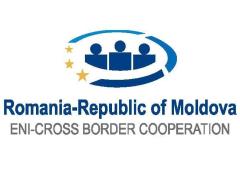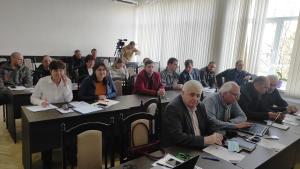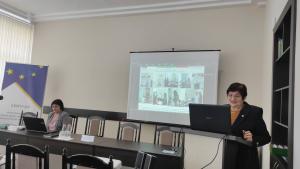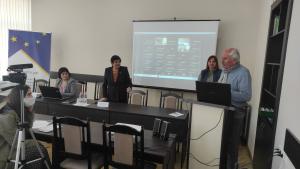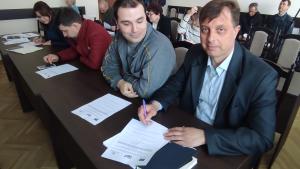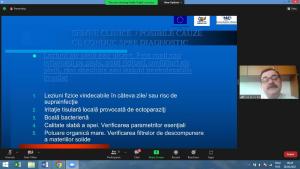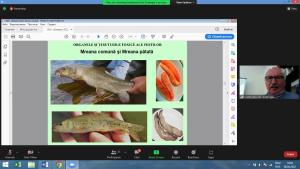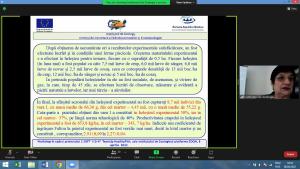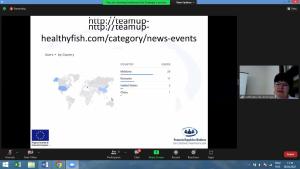- 135 views
On 8 of April 2022, within the cross-border project 2 SOFT/1.2/47 „Team up for healthy fish in aquaculture systems of the Prut river basin” – TeamUp HealthyFish (Joint Operational Program Romania-Republic of Moldova 2014-2020, funded by the European Union), a scientific workshop on the current state of fish farming in the basin of the Prut river and perspectives for its improvement was held. Workshop was organised by the Institute of Zoology jointly with the project partner – Iasi Ion Ionescu de la Brad University of Life Sciences.
The mixed format of the event allowed to bring together a large number of people (86) from the Republic of Moldova and Romania, who represented various groups of beneficiaries: researchers (Institute of Zoology, Center for Research of Aquatic Genetic Resources „ACVAGENRESURS”, Institute of Ecology and Geography), didactic staff and students (Iasi University of Life Sciences, Dunarea de Jos University from Galati, State University of Tiraspol (located in Chisinau), College of Ecology from Chisinau, C. Stere College of Integrated Studies from Drochia), fish farmers and representatives of central public authorities (Ministry of Environment, Inspectorate for Protection of Environment).
The workshop program included three scientific reports, which were dedicated to the diversity, diagnosis, treatment and prophylaxis of the most common diseases encountered in fish in Romania, innovations in disease treatment (Prof. Vasile Vulpe, Iasi ULS), diseases prevalent in fish from natural water bodies and ponds in the Republic of Moldova and measures to combat them (Dr. Ilya Trombitsky, Eco-TIRAS International Association of River Keepers), water quality in ponds, problems faced by fish farmers, technologies to increase the resistance of fish (Corr. mem. Elena Zubcov, Institute of Zoology).
Based on the data presented by the rapporteurs and the discussions held during the workshop, the following general conclusions were made regarding the current state of fish farming in ponds and the prospects for its improvement:
1. The state of fish farming in the Republic of Moldova can be characterized as disastrous, including of that performed in the basin of the Prut River, where no enterprise has the full production cycle (larvae – fry – juveniles – table fish– broodfish).
2. There is no adequate evidence of the ecological status of aquatic ecosystems used for fish rearing, quantity of fish produced and the quality of fish farming products in the Republic of Moldova and the technologies used in fish farming are not supervised by the state.
3. The development of organic fish farming in ponds depends, first of all, on the availability of sufficient volumes of water. Given the high cost of the pumping of water from natural ecosystems, the water supply of ponds is currently based almost exclusively on atmospheric precipitation.
4. The prohibition by law (Law no. 149/2006 on fish stock, fisheries and fish farming, art. 29, (2) of the pond draining affects the productivity of fish farming and the quality of the fish product.
5. The lack of regulation of the trade of import fish affects the trade of the local fish product, which has a negative impact on the activity of fish farmers from the Republic of Moldova.
6. In order to restore the state of fish farming in the Republic of Moldova, it is necessary to:
- harmonize the legislative and institutional framework in the field of aquaculture with European standards and regulations;
- access the international and European aquaculture organizations and networks;
- include the objective of the development of fish farming and of the measures for the protection of water bodies in the National Development Plan;
- subsidize the fish farming, including by applying of projects to obtain financial support from external creditors for the introduction of modern technologies in fish farming (FAO, UN - „Water and Health”, etc.);
- carry out scientific investigations, by organizing demonstration or quality testing pilot laboratories, with training of staff for quality testing;
- train the qualified personnel for the implementation of tasks in the field (fish farmers, quality experts);
- enforce effectively legislation through cooperation with civil society, information and education of the population;
- include in the list of mandatory indicators of the state statistics of data on aquaculture and fisheries.
7. In order to prevent diseases a prophylactic treatment of fish stocking material (larvae, juveniles) is strongly recommended.
8. In order to improve the level of control of fish diseases and parasites, it is necessary to:
- replace the sporadic control of the origin and quality of fish stocking material (larvae, juveniles) and of water quality used in aquaculture with the permanent one;
- improve the ability to diagnose fish diseases and parasites;
- properly manage the quality and quantity of pond water;
- ensure sustainable management of ponds and fish feeds;
- increase the knowledge of fish farmers and specialists on the prevention, diagnosis and treatment of fish diseases.
At the end of the event, Dr. Nadejda Andreev made an overview of the partners' achievements within the TeamUp HealthyFish project between November 2020 and March 2022.
The workshop was followed by a press conference, which can be viewed HERE.
It should be mentioned that the workshop was reflected in the media through a press release on the website of the Academy of Sciences of Moldova and an article in the newspaper „Saptămîna” from 22 of April 2022.
Download the press release in pdf HERE.
Lucia Bilețchi
